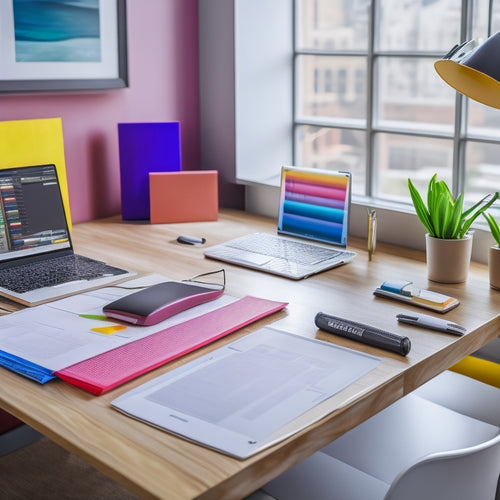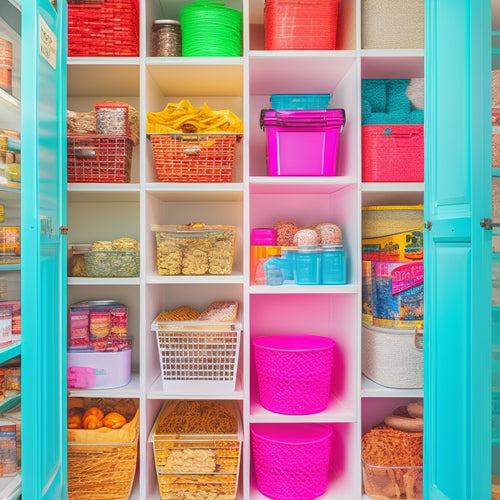
Essential Chlorine Tablet Storage Guidelines for Pools
Share
You store chlorine tablets for your pool in a dedicated area to prevent degradation, maintain their effectiveness, and guarantee safe handling. Choose a high-density polyethylene (HDPE) container resistant to chlorine corrosion and place it in a stable temperature environment between 50°F and 75°F. Avoid high humidity areas, direct sunlight, and open flames. Regularly inspect tablets for damage, degradation, or expiration, and track their consumption and disposal. Wear protective gear and prioritize safety handling to prevent accidents and exposure. By following these guidelines, you'll be well on your way to creating a safe and effective chlorine tablet storage system - and there's more to explore to ensure top-notch results.
Key Takeaways
• Select HDPE containers resistant to chlorine corrosion and maintain them regularly for durability and effectiveness.
• Store tablets in a stable temperature environment between 50°F and 75°F, away from high humidity and direct sunlight.
• Keep tablets away from open flames, heaters, or ignition sources, and store them in a cool, dry place with a tight-fitting lid.
• Regularly inspect tablets for damage, degradation, or expiration, and monitor chlorine levels in pool water to adjust dosage as needed.
• Wear protective gear and follow manufacturer's instructions for safe handling and disposal to prevent accidents and environmental harm.
Proper Storage Container Selection
When selecting a storage container for your chlorine tablets, opt for a high-density polyethylene (HDPE) container that's resistant to chlorine corrosion, as it will provide a vital and durable storage solution. This type of container will withstand the harsh properties of chlorine, guaranteeing your tablets remain intact and effective.
Regular container maintenance is essential to prevent damage and contamination. Make sure the container is clean and dry before storing new tablets. Proper labeling is also necessary, as it allows for easy identification and tracking of your chlorine tablets. Clearly label the container with the type and quantity of tablets, as well as the date of storage.
Ideal Storage Locations and Conditions
Select a storage location that provides a stable temperature environment between 50°F and 75°F, guaranteeing ideal conditions for your chlorine tablets. This temperature range prevents degradation and maintains the tablets' effectiveness.
| Consideration | Reason |
|---|---|
| Storage temperature considerations | Prevents degradation and maintains tablet effectiveness |
| Container size options | Allows for air circulation and prevents breakage |
| Air circulation importance | Reduces moisture accumulation and prevents tablet degradation |
When choosing a storage location, remember to avoid high humidity areas and direct sunlight exposure. Keep tablets away from other chemicals to prevent reactions. Consider dedicated outdoor storage options that provide UV protection features and proper ventilation. By following these guidelines, you'll secure the optimal storage conditions for your chlorine tablets.
Indoor and Outdoor Storage Tips
You can safeguard the integrity of your chlorine tablets by following specific indoor and outdoor storage guidelines that cater to their unique requirements.
For indoor storage, keep tablets away from open flames, heaters, or ignition sources, and avoid proximity to water sources to prevent degradation. Guarantee proper ventilation in enclosed spaces and organize your storage area for easy monitoring and usage. Store them in a cool, dry place with a tight-fitting lid.
For outdoor storage, invest in dedicated containers, elevate them to prevent ground contact, and position them in shaded areas. Secure containers with locks or latches, and make sure they're weatherproof and well-sealed.
Monitoring and Maintaining Tablets
Regular inspections of your chlorine tablets are important to maintain their effectiveness and prevent degradation, so it's crucial to establish a routine monitoring schedule.
You should regularly check your tablets for signs of damage, degradation, or expiration. Measure chlorine levels in your pool water and adjust the dosage as needed to guarantee the best tablet effectiveness.
Keep track of tablet consumption and disposal to maintain a steady supply and prevent overstocking. It's also essential to follow the manufacturer's disposal guidelines for unused tablets.
Safety Precautions and Disposal
Proper handling and storage of chlorine tablets are essential to preventing accidents and ensuring effective pool water sanitation, so it's vital that you take necessary safety precautions when dealing with these tablets.
When handling chlorine tablets, you must prioritize safety handling to avoid accidents and exposure. Here are some essential safety precautions to follow:
-
Wear protective gear: Gloves, goggles, and masks can protect you from skin and eye irritation, as well as inhalation of chlorine fumes.
-
Ensure proper ventilation: Avoid storing tablets in confined spaces or areas with poor airflow to prevent the buildup of toxic fumes.
-
Dispose of tablets properly: Follow the manufacturer's instructions for disposing of unused or expired tablets to prevent environmental harm and contamination.
Frequently Asked Questions
Can I Store Chlorine Tablets Near My Pool's Electrical Equipment?
You shouldn't store chlorine tablets near your pool's electrical equipment due to spark risk and corrosion concern; instead, choose a safe location that's well-ventilated, dry, and away from ignition sources to prevent accidents.
How Often Should I Rotate My Chlorine Tablet Stock for Optimal Freshness?
Imagine a ticking time bomb of stale chlorine tablets, waiting to contaminate your pool water. You should rotate your stock every 3-6 months to guarantee maximum freshness, considering tablet age and proper stock organization.
Are There Any Alternatives to HDPE Containers for Chlorine Tablet Storage?
You can consider alternatives to HDPE containers, such as metal drums or plastic bins, but make sure they're resistant to chlorine corrosion and provide a tight-fitting lid or secure seal to preserve tablet integrity.
Can I Use Chlorine Tablets Past Their Expiration Dates in Emergency Situations?
"In a pinch, you're tempted to reuse expired chlorine tablets, but don't gamble with pool safety. Treat them like expired medicine - ineffective and potentially hazardous. Prioritize emergency supplies with a reliable shelf life to avoid compromised water quality."
Are There Any Chlorine Tablet Storage Options Specifically Designed for Above-Ground Pools?
You can store chlorine tablets for your above-ground pool in a dedicated Pool Shed or Deck Container, designed to protect them from the elements and provide easy access, while ensuring safety and maximum usage.
Related Posts
-

Boost Productivity With Free Google Sheets Templates
You can enhance your productivity exponentially by utilizing free Google Sheets templates, which offer a proven way t...
-

Community Engagement: Learning Through Professions
Community engagement is a powerful tool for fostering a deeper understanding of various professions among children. B...
-

Revamp Your Pantry With Dollar Store Hacks
You can transform your pantry from a cluttered disaster zone to a sleek and functional space with just a few trips to...


